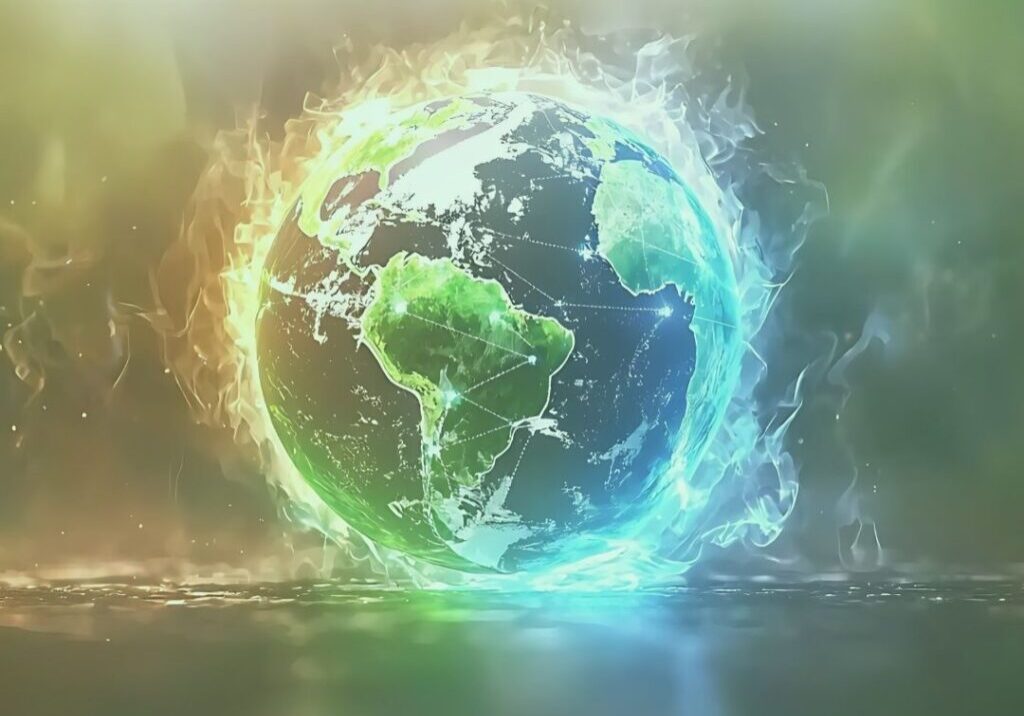Marshall McLuhan: A Prophet of Teilhard’s Vision
 The Center for Christogenesis seeks to integrate religion, culture, modern science and evolution in a way that illuminates a divine power of love acting from within toward a future of unified life. Our content can range from theology proper to politics to gene editing or whatever else is impacting human life. Our purpose is to deepen our understanding to integrate these dimensions in ways that can help us co-create the world toward greater unity.
The Center for Christogenesis seeks to integrate religion, culture, modern science and evolution in a way that illuminates a divine power of love acting from within toward a future of unified life. Our content can range from theology proper to politics to gene editing or whatever else is impacting human life. Our purpose is to deepen our understanding to integrate these dimensions in ways that can help us co-create the world toward greater unity.
One of the more difficult topics to engage, surprisingly, is technology. Recently I wrote a book called Re-Enchanting the Earth: Why AI Needs Religion. It is a challenging book for many people because of the way we judge technology in the human community. Simply put, we think of technology as a tool, not as an extension of ourselves. Teilhard thought otherwise. His notion of the Noosphere signaled a new level of mind [that is, consciousness] on a new level of electronic interconnected life. This new level of mind is the unfolding of Christ in evolution, the power of divine love moving us beyond our partial selves toward a new global community.
One of the most prophetic intellectuals of the twentieth century who understood Teilhard’s vision was the philosopher of media Marshall McLuhan, a devoted Catholic and a deeply incarnational thinker. In a spellbinding 1969 interview with Playboy [yes, “Playboy!”] McLuhan laid out the breathtaking paradigm shift being brought about by technology, a shift that undergirds the movement of Christogenesis. I would like to offer here excepts from McLuhan’s insightful interview. The language is dated but the ideas anticipate the world we find ourselves in today. He said:
All media, from the phonetic alphabet to the computer, are extensions of man that cause deep and lasting changes in him and transform his environment. Such an extension is an intensification, an amplification of an organ, sense or function, and whenever it takes place, the central nervous system appears to institute a self-protective numbing of the affected area, insulating and anesthetizing it from conscious awareness of what’s happening to it.
The total-field awareness engendered by electronic media is enabling us—indeed, compelling us—to grope toward a consciousness of the unconscious, toward a realization that technology is an extension of our own bodies. We live in the first age when change occurs sufficiently rapidly to make such pattern recognition possible for society at large. Until the present era, this awareness has always been reflected first by the artist, who has had the power—and courage—of the seer to read the language of the outer world and relate it to the inner world.
It’s always been the artist who perceives the alterations in man caused by a new medium, who recognizes that the future is the present, and uses his work to prepare the ground for it. But most people, from truck drivers to the literary Brahmins, are still blissfully ignorant of what the media do to them; unaware that because of their pervasive effects on man, it is the medium itself that is the message, not the content, and unaware that the medium is also the—that, all puns aside, it literally works over and saturates and molds and transforms every sense ratio.
I want to pause here to emphasize McLuhan’s insight: the medium is the message. We are reading the wrong the signals; we are reading words, not forms.The types of relationships rather than the content of relationships are the most influential factors of human formation and thus world formation. He goes on to say:
The present is always invisible because it’s environmental and saturates the whole field of attention so overwhelmingly; thus everyone but the artist, the person of integral awareness, is alive in an earlier day. In the midst of the electronic age of software, of instant information movement, we still believe we’re living in the mechanical age of hardware. At the height of the mechanical age, the human turned back to earlier centuries in search of “pastoral” values. The Renaissance and the Middle Ages were completely oriented toward Rome; Rome was oriented toward Greece, and the Greeks were oriented toward the pre-Homeric primitives.
In the past, the effects of media were experienced more gradually, allowing the individual and society to absorb and cushion their impact to some degree. Today, in the electronic age of instantaneous communication, I believe that our survival, and at the very least our comfort and happiness, is predicated on understanding the nature of our new environment, because unlike previous environmental changes, the electric media constitute a total and near-instantaneous transformation of culture, values and attitudes. This upheaval generates great pain and identity loss, which can be ameliorated only through a conscious awareness of its dynamics. If we understand the revolutionary transformations caused by new media, we can anticipate and control them; but if we continue in our self-induced subliminal trance, we will be their slaves.
Because of today’s terrific speed-up of information moving, we have a chance to apprehend, predict and influence the environmental forces shaping us—and thus win back control of our own destinies. The new extensions of man and the environment they generate are the central manifestations of the evolutionary process, and yet we still cannot free ourselves of the delusion that it is how a medium is used that counts, rather than what it does to us and with us.
Here McLuhan identifies the shift in culture, from the fragmented literary person to the retribalizing integrated person, a shift that can be described under the rubric of the posthuman. He states:
Our own Western time-space concepts derive from the environment created by the discovery of phonetic writing, as does our entire concept of Western civilization. The man of the tribal world led a complex, kaleidoscopic life precisely because the ear, unlike the eye, cannot be focused and is synaesthetic rather than analytical and linear. Speech is an utterance, or more precisely, an outering, of all our senses at once; the auditory field is simultaneous, the visual successive. The models of life of nonliterate people were implicit, simultaneous and discontinuous, and also far richer than those of literate man. By their dependence on the spoken word for information, people were drawn together into a tribal mesh; and since the spoken word is more emotionally laden than the written—conveying by intonation such rich emotions as anger, joy, sorrow, fear—tribal man was more spontaneous and passionately volatile. Audile-tactile tribal man partook of the collective unconscious, lived in a magical integral world patterned by myth and ritual, its values divine and unchallenged, whereas literate or visual man creates an environment that is strongly fragmented, individualistic, explicit, logical, specialized and detached.
Any culture is an order of sensory preferences, and in the tribal world, the senses of touch, taste, hearing and smell were developed, for very practical reasons, to a much higher level than the strictly visual. Into this world, the phonetic alphabet fell like a bombshell, installing sight at the head of the hierarchy of senses. Literacy propelled man from the tribe, gave him an eye for an ear and replaced his integral in-depth communal interplay with visual linear values and fragmented consciousness. As an intensification and amplification of the visual function, the phonetic alphabet diminished the role of the senses of hearing and touch and taste and smell, permeating the discontinuous culture of tribal man and translating its organic harmony and complex synaesthesia into the uniform, connected and visual mode that we still consider the norm of “rational” existence.
The whole man became fragmented man; the alphabet shattered the charmed circle and resonating magic of the tribal world, exploding man into an agglomeration of specialized and psychically impoverished “individuals,” or units, functioning in a world of linear time and Euclidean space.
The cultural aggression of white America against Negroes [read “Black”] and Indians [“Native American”] is not based on skin color and belief in racial superiority, whatever ideological clothing may be used to rationalize it, but on the white man’s inchoate awareness that the Negro and Indian—as men with deep roots in the resonating echo chamber of the discontinuous, interrelated tribal world—are actually psychically and socially superior to the fragmented, alienated and dissociated man of Western civilization. Such a recognition, which stabs at the heart of the white man’s entire social value system, inevitably generates violence and genocide. It has been the sad fate of the Negro and the Indian to be tribal men in a fragmented culture—men born ahead of rather than behind their time.
I mean that at precisely the time when the white younger generation is retribalizing and generalizing, the Negro and the Indian are under tremendous social and economic pressure to go in the opposite direction: to detribalize and specialize, to tear out their tribal roots when the rest of society is rediscovering theirs. Long held in a totally subordinate socioeconomic position, they are now impelled to acquire literacy as a prerequisite to employment in the old mechanical service environment of hardware, rather than adapt themselves to the new tribal environment of software, or electric information, as the middle-class white young are doing. Needless to say, this generates great psychic pain, which in turn is translated into bitterness and violence.
This violence has traditionally been directed at the tribal man who challenged visual-mechanical culture, as with the genocide against the Indian and the institutionalized dehumanization of the Negro. Today, the process is reversed and the violence is being meted out, during this transitional period, to those who are non assimilable into the new tribe. Not because of his skin color but because he is in a limbo between mechanical and electric cultures, the Negro is a threat, a rival tribe that cannot be digested by the new order. The fate of such tribes is often extermination.
But as I said, the Negro arouses hostility in whites precisely because they subliminally recognize that he is closest to that tribal depth involvement and simultaneity and harmony that is the richest and most highly developed expression of human consciousness. This is why the white political and economic institutions mobilize to exclude and oppress Negroes, from semiliterate unions to semiliterate politicians, whose slim visual culture makes them hang on with unremitting fanaticism to their antiquated hardware and the specialized skills and classifications and compartmentalized neighborhoods and life styles deriving from it. The lowest intellectual stratum of whites view literacy and its hardware environment as a novelty, still fresh and still status symbols of achievement, and thus will be the last to retribalize and the first to initiate what could easily become a full-blown racial civil war.
Violence can be avoided if we comprehend the process of decentralism and retribalization, and accept its outcome while moving to control and modify the dynamics of change. In any case, the day of the stupor state is over; as men not only in the U.S. but throughout the world are united into a single tribe, they will forge a diversity of viable decentralized political and social institutions.
It will be a totally retribalized world of depth involvements. Through radio, TV and the computer, we are already entering a global theater in which the entire world is a Happening. Our whole cultural habitat, which we once viewed as a mere container of people, is being transformed by these media and by space satellites into a living organism, itself contained within a new macrocosm or connubium of a supraterrestrial nature. The day of the individualist, of privacy, of fragmented or “applied” knowledge, of “points of view” and specialist goals is being replaced by the over-all awareness of a mosaic world in which space and time are overcome by television, jets and computers—a simultaneous, “all-at-once” world in which everything resonates with everything else as in a total electrical field, a world in which energy is generated and perceived not by the traditional connections that create linear, causative thought processes, but by the intervals, or gaps, which … create synaesthetic discontinuous integral consciousness.
The day of political democracy as we know it today is finished. Let me stress again that individual freedom itself will not be submerged in the new tribal society, but it will certainly assume different and more complex dimensions. The ballot box, for example, is the product of literate Western culture—a hot box in a cool world—and thus obsolescent. The tribal will is consensually expressed through the simultaneous interplay of all members of a community that is deeply interrelated and involved, and would thus consider the casting of a “private” ballot in a shrouded polling booth a ludicrous anachronism. The TV networks’ computers, by “projecting” a victor in a Presidential race while the polls are still open, have already rendered the traditional electoral process obsolescent.
In our software world of instant electric communications movement, politics is shifting from the old patterns of political representation by electoral delegation to a new form of spontaneous and instantaneous communal involvement in all areas of decision making. In a tribal all-at-once culture, the idea of the “public” as a differentiated agglomerate of fragmented individuals, all dissimilar but all capable of acting in basically the same way, like interchangeable mechanical cogs in a production line, is supplanted by a mass society in which personal diversity is encouraged while at the same time everybody reacts and interacts simultaneously to every stimulus. The election as we know it today will be meaningless in such a society.
We must understand that a totally new society is coming into being, one that rejects all our old values, conditioned responses, attitudes and institutions. If you have difficulty envisioning something as trivial as the imminent end of elections, you’ll be totally unprepared to cope with the prospect of the forthcoming demise of spoken language and its replacement by a global consciousness.
Tribal man is tightly sealed in an integral collective awareness that transcends conventional boundaries of time and space. As such, the new society will be one mythic integration, a resonating world akin to the old tribal echo chamber where magic will live again. … Electric technology, you see, does not require words any more than a digital computer requires numbers. Electricity makes possible—and not in the distant future, either—an amplification of human consciousness on a world scale, without any verbalization at all.
Via the computer, we could logically proceed from translating languages to bypassing them entirely in favor of an integral cosmic unconsciousness somewhat similar to the collective unconscious envisioned by Bergson. The computer thus holds out the promise of a technologically engendered state of universal understanding and unity, a state of absorption in the logos that could knit mankind into one family and create a perpetuity of collective harmony and peace. This is the real use of the computer, not to expedite marketing or solve technical problems but to speed the process of discovery and orchestrate terrestrial—and eventually galactic—environments and energies. Psychic communal integration, made possible at last by the electronic media, could create the universality of consciousness foreseen by Dante when he predicted that men would continue as no more than broken fragments until they were unified into an inclusive consciousness. In a Christian sense, this is merely a new interpretation of the mystical body of Christ; and Christ, after all, is the ultimate extension of man.
Marshall McLuhan anticipated the great paradigm shift of the 21st century through computer technology and media communications, the same shift that Teilhard de Chardin anticipated in his essays on The Future of Man. It is time we wake up to the world we are creating, the networked world of complexified consciousness. We are moving toward a new type of entity, a new world order, a new type of human. This movement is not outside the walls of religion; in Teilhard’s view it is the power of God within, the power of the One, active and alive in an unfinished universe.
If we are to move into an integrated world of sustainability, a world of peace and justice, we must bring religion up to speed. We need a new theology at home in a world of change. I have tried to expound what this means in Re-Enchanting the Earth, but the book cannot be read while looking in the rearview mirror. We must look ahead with open eyes and hearts, to see the crucified Christ struggling in evolution to breakthrough into resurrection, and to know that we are the Christ.
 View print-friendly version
View print-friendly version
4 Comments
Related Posts

Is Christianity in Crisis or Transition?
We are facing an unprecedented convergence of crises: global warming, climate change, mass migration, and systemic ecological collapse. Our planetary systems are exhausted and no longer able to sustain human…


Susan, bless you and your art that will bring these ideas to light.
As an artist, I am eager to bring physicality to these ideas. The new Renaissance is in the making, and I am working day and night to see beyond my own limitations to bring it to light for all to experience. These are exciting times!!!
I feel McCluhan had several radical ideas that bear some truth. However, I also feel some need for their expansion, and other thoughts need to be included.
Regarding racism..his ideas certainly apply. However, racism was not grounded in “envy”. It was grounded in power over others. The negroes taken from Africa were taken from the motive for profit…as were the lands of the indigenous. And the taking was not advanced primarily because of the advents of technologies of written language as such; but due to the propagation of information regarding power…gunpowder…guns and cannons…power over others in a new and larger way.
There is a central piece imo. missing in his discussion regarding evolution…from primary sensory tribal states to informational driven individualism. That is how language facilitated individualism…Ego. Language differentiated not just “group think/feel” but also attention to the ways deeper communication within comes through both silence, and heart creativities…art and family.
Nor does the essay delve into “religious evolution”. The teachings of Jesus were meant to significantly change the Hebrew religion of those times. The story of the Prodigal Son and others portrayed a Loving “non judgemental” God, as opposed to the judgemental God of the story of Adam and Eve. Yet many of the evolutionary teachings of Jesus were lost along the way…due to various factors. Religious politics was a major factor…the Council of Nicea disregarding certain teachings and directions. Likewise, the writings of Christian teachings derived from the Greek…which did not fully take in the meanings of Jesus Aramaic language. I have read that “follow me in my name” did not mean to worship as the “son of God”; but was an aramaic idiom meaning to “live as I have lived and taught”. That latter message was also evolutionary. In the again as ever “recieved” teachings, the Course in Miracles, implied as given through Jesus, notes that his journey was about the resurrection, not the crucifixion. It was a demonstration that through following the ways of Jesus life, one would be “resurrected”…and denote that all of our “sins” were as errors…that essentially were illusions. The body, and its errors…are illusions, not our truth. Thereby, that recognition, and following the knowing of God within…the way of Jesus, forgiveness reigns as Love of God within… is supreme.
Yet why has not that reigned? Politics of the Ego again imo. Yet another “recieved” work, the Joseph Communications by Michael Reccia explores what could be “evolutionary” thought in the book “The Fall”. In this it is described that the inhabitants of earth were angelic beings. At one point they, as a group, felt that they could “speed up” the return to God via manipulation of positive and negative creative energies/universal forces. They were advised that their theory was incorrect and should not be attempted. However, they were adamant and used those forces as they felt. This action resulted in thoughts and ideas of separation from God. Ideas, being “living, the stuff of life”, and held by human form, created a “Field” of this thought that persists. Thereby, the thought of separation has persisted, and humanity has been destroyed by that paradigm more that once. Always returning…in order to transcend that erroneous thinking…yet due to the effects of the Field…repeating the error. I feel these thoughts from this work bear significance and are worthy of consideration.
As an artist, I have several thoughts regarding his notes on considerations of art; but I will include those in another passage after I have read your book.
Blessings and appreciation for your endeavors. jim foreman
Thank you for this Ilia. I just received Re-Enchanting the Earth and look forward to reading it. Many years ago when studying Teilhard I came to a realization that we are not creating the “networked world of complexified consciousness” rather it created us and we are just now awakening to its mystery. Technology isn’t an extension of ourselves, its a mirror of ourselves. We are coming to see that we are interconnected, entangled at every level and what we think, say, and do is the software that affects all the parts. We need software that is not corrupted by viruses that fragment our system. That’s the job of the disk defragmenter in our operating system. We need a good tune up of the whole operating system….or maybe a whole new operating system…one that begins with the whole.. Yes, we need not look into the rear view mirror, just the mirror on the world screen in front of us to see our soul’s passion to know ourselves..